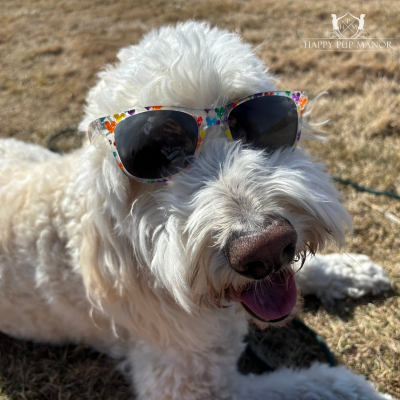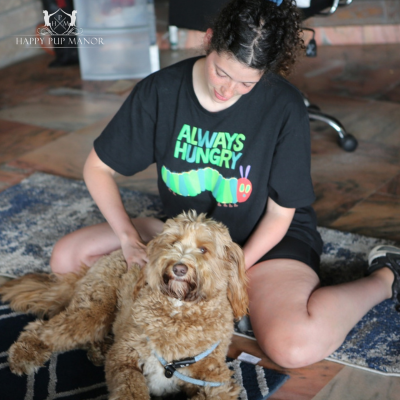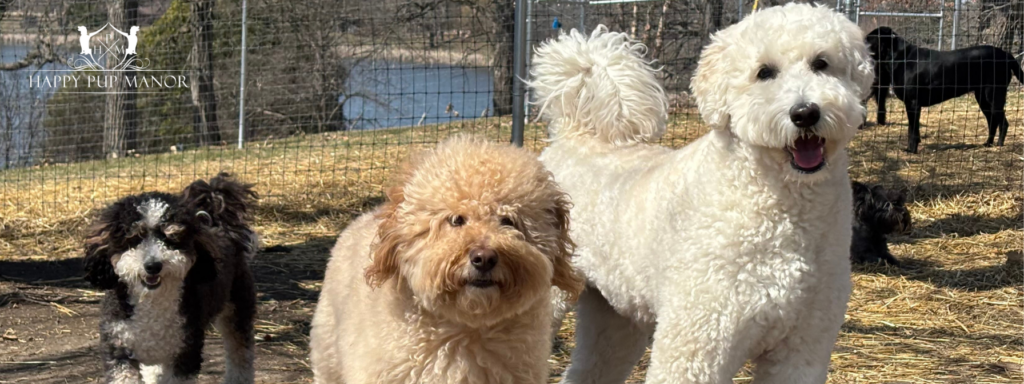Labradoodle vs Goldendoodle: Which Doodle is Best for You?

Labradoodle vs Goldendoodle: Which Doodle is Best for You?
Labradoodles and Goldendoodles have both taken the canine world by storm — and for good reason. These fluffy, friendly dogs are known for their intelligence, charm, and family-friendly temperaments. But if you’re deciding between the two, you may be wondering: what sets Labradoodles vs Goldendoodles apart in terms of temperament, grooming, and family compatibility?
As dog experts and trainers at Happy Pup Manor, we’ve worked with countless Labradoodles and Goldendoodles and are here to help you understand the differences. We’ll explore their origins, temperament, grooming needs, health considerations, and more so you can find the right doodle for your lifestyle.
Origins and Breeding
Goldendoodles trace their origins to the 1960s when Monica Dickens, great-granddaughter of renowned author Charles Dickens, began breeding them as guide dogs for individuals with allergies. Her initiative fulfilled a unique need in her community and laid the groundwork for future breeders. Among them, Judy Hahn played an influential role in promoting ethical breeding practices for doodles in the U.S. Meanwhile, Amy Lane is credited with launching one of the first organized Goldendoodle breeding programs and creating the first known litter of miniature Goldendoodles in 2002 by crossing a Golden Retriever with a Miniature Poodle. These pioneers helped establish the breed’s foundation and popularity.
Labradoodles were first introduced in the late 1980s by Australian breeder Wally Conron while working with the Royal Guide Dog Association of Australia in Victoria. Conron aimed to create a guide dog suitable for people with allergies by combining the gentle temperament and trainability of the Labrador Retriever with the low-shedding, hypoallergenic coat of the Poodle. To help overcome the public’s reluctance toward mixed breeds, he coined the catchy name “Labradoodle” — a strategic marketing move that helped drive interest and ultimately contributed to the widespread popularity of this crossbreed.
Though both doodles share Poodle lineage, their behavior and care needs can vary based on their retriever parent. Understanding the nuances between the Labrador and Golden Retriever heritage helps prospective owners choose a companion that aligns with their lifestyle and expectations.
Goldendoodle Temperament vs Labradoodle Personality

At first glance, both Labradoodles and Goldendoodles seem equally cheerful, loving, and sociable — and in many cases, that’s true. Both breeds are intelligent, people-focused, and respond beautifully to positive reinforcement. However, beneath the surface, there are some behavioral differences that potential dog parents should know, especially if you’re trying to match a pup to your lifestyle.
Labradoodles tend to be energetic, confident, and highly trainable. Their Labrador heritage often gives them a “can-do” attitude and strong work ethic, which means they thrive with consistent routines, mental stimulation, and physical activity. In most environments, Labradoodles adapt well and exhibit consistent behavior patterns that closely reflect their parent breeds, making them a great match for active households that enjoy regular play, structure, and engagement.
Goldendoodles, by contrast, are typically more affectionate and gentle, but can also be more emotionally sensitive. While many Goldendoodles are loving and eager to please, the 2020 study “Expression of Behavioural Traits in Goldendoodles and Labradoodles” found that Goldendoodles demonstrated more variability in temperament than Labradoodles. Specifically, Goldendoodles showed significantly higher tendencies toward dog-directed fear, stranger-directed fear, and dog-directed aggression — behaviors that weren’t as pronounced in Labradoodles or their purebred parent breeds.
The researchers analyzed behavioral data from over 5,000 dogs using the C-BARQ (Canine Behavioral Assessment and Research Questionnaire), a well-validated tool completed by dog owners worldwide. Labradoodles only differed significantly in one category — dog rivalry — and otherwise aligned closely with Labradors and Poodles in temperament. This consistency may make them more predictable for first-time owners seeking a stable temperament.
Goldendoodles, meanwhile, presented with wider temperament variation, which may stem from a combination of genetic influences, early environment, and the type of Poodle (Miniature vs. Standard) used in the cross. For instance, Miniature Poodles have been associated with more anxiety and sensitivity-related traits, which may influence behavioral outcomes in smaller Goldendoodles.
What does this mean for you? While both breeds are wonderful companions, Goldendoodles may require more intentional early socialization and gentle, positive exposure to new people, dogs, and environments to build confidence and reduce fear-based behaviors. Labradoodles may thrive with task-based training, agility, or games that keep their active minds and bodies engaged.
Related Reading: Why Is Puppy Socialization So Important?
Grooming Needs & Coat Types in Doodles
Because both breeds are part Poodle, they typically have wavy or curly coats that can be low-shedding, but this is not guaranteed. Coat types vary:

- Goldendoodles often have softer, longer coats that resemble their Golden Retriever parent.
- Labradoodles may have a shorter, more wiry texture influenced by the Labrador parent.
Both breeds require regular grooming, brushing, and trimming. Without consistent care, their coats can mat quickly, especially around the ears, legs, and underarms. These hypoallergenic doodles need professional grooming every 6–8 weeks to maintain healthy skin and coats.
Professional grooming doesn’t just keep your doodle looking beautiful — it also plays a crucial role in their overall health and comfort. Regular grooming reduces the risk of painful matting, skin infections, and parasites, and allows for early detection of issues like lumps, ear problems, or dental concerns. As we share in our blog What Are the Benefits of Professional Grooming?, grooming is far more than cosmetic — it’s essential care for your pup.
Need grooming help? See how our expert groomers keep doodles looking their best
Labradoodle vs Goldendoodle: Exercise Needs & Activity Levels

Labradoodles are energetic dogs who love staying active. Thanks to their Labrador roots, they often have a strong desire to move, work, and play. They thrive on activities like daily walks, jogs, agility courses, and games of fetch. But it’s not just about physical activity — Labradoodles also need mental challenges to stay happy. They do well with enrichment activities like puzzle toys, scent games, and training exercises that let them use their brains and burn energy in healthy ways.
Goldendoodles, on the other hand, tend to have a gentler approach to life. While they still enjoy walks, playtime, and training, they’re usually more laid-back than Labradoodles. Goldendoodles are known for their affectionate and people-loving personalities. They’re just as happy relaxing on the couch with you as they are playing in the yard. This makes them a great match for families who want an interactive but easygoing pup.
No matter which breed you choose, both Labradoodles and Goldendoodles benefit from a regular routine that includes movement and mental stimulation. Simple activities like hide-and-seek, meeting new dogs and people, or working on obedience skills help keep them calm and well-adjusted. These dogs love having a “job” to do, and with positive reinforcement and consistent structure, they truly shine.
Related Reading: What is Obedience Training and Why Does it Matter?
Common Health Issues in Labradoodles and Goldendoodles

Like all dogs, Labradoodles and Goldendoodles can inherit certain health conditions from their parent breeds. Goldendoodles may be more prone to hip dysplasia, heart conditions, and especially ear infections. Their floppy ears — a trait from their Golden Retriever parent — can easily trap moisture and dirt, making regular ear cleaning a must to prevent discomfort and infection.
Labradoodles share some of the same risks, including hip and joint issues. However, they may also be more susceptible to eye disorders such as progressive retinal atrophy (PRA), a condition that can gradually affect vision. Regular eye exams and early screening can help catch any issues before they progress.
While these conditions might sound daunting, many can be managed or even prevented with proactive care. Keeping your doodle healthy starts with consistent vet checkups, a balanced diet, daily exercise, and staying on top of grooming and hygiene. It’s also crucial to choose a breeder who prioritizes health testing and is transparent about the genetic history of their dogs.
And because doodles are mixed breeds, each one is unique. Their individual health needs may vary, making it even more important to work closely with your vet to create a personalized care plan. A little preparation goes a long way in ensuring your pup lives a long, happy, and healthy life.
Related Reading: What Shots Does My Puppy Need?
Which Doodle is Right for You?

Trying to decide which doodle is right for your home? It ultimately comes down to your lifestyle and the kind of canine companion you’re looking for.
Choose a Goldendoodle if you’re looking for a gentle, affectionate pup who thrives on cuddles and fits seamlessly into family life. These dogs tend to have a calm temperament and a strong desire to please, making them wonderful companions for families, seniors, or anyone seeking a loving and loyal friend. Their softer energy makes them especially suited for relaxed households that prioritize companionship.
Opt for a Labradoodle if you’re seeking an energetic, intelligent dog that enjoys daily activity, play, and problem-solving. Labradoodles are known for their zest for life, making them ideal for families who love the outdoors, frequent walks, or engaging in agility or fetch. Their drive and eagerness to learn mean they thrive in structured training programs and environments where their minds stay stimulated.
No matter which doodle captures your heart, one thing remains true: both Labradoodles and Goldendoodles benefit from thoughtful guidance and enrichment.
Related Reading: I’m Ready for a Puppy! — A Guide to Choosing the Right Doodle Breed
Ready to Welcome a Doodle?

Whether you’re drawn to a Labradoodle’s energy or a Goldendoodle’s snuggly nature, Happy Pup Manor is here to guide your doodle journey. Our doodle experts specialize in training and grooming Labradoodles and Goldendoodles, ensuring your pup thrives from the start.
At Happy Pup Manor, we offer specialized training programs designed for these breeds to help nurture well-mannered, confident companions. Our programs focus on obedience, confidence-building, and manners, ensuring your doodle grows into the best version of themselves, ready for family life, adventures, and everything in between.
Explore our training programs or learn more about our doodle grooming services to get started.










